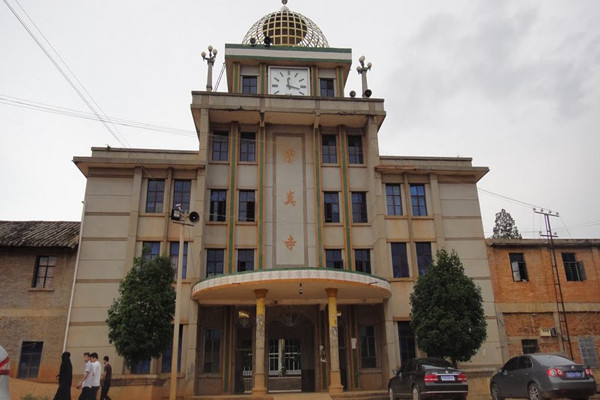Maoke Mosque in Wenshan

Chinese Name: 文山茂克清真寺
Chinese Pinyin: When Shan Mao Ke Qing Zhen Si
English Name: Maoke Mosque in Wenshan
Type: Mosque, Cultural & Historical Landmarks
Visiting Hours: 30 minutes - 1 hour
Opening Time: 8:00-17:30
Tickets Fee: Free
Address:Hongdian Village, Wenshan County, Yunnan Province.
Maoke Mosque (茂克清真寺) is an Islamic religious venue located on Xinzhaijie Street (新寨街), Maoke Village (茂克村), Hongdian Hui Ethnic Township (红甸回族乡), Wenshan City (文山市), Yunnan Province (云南省). It is officially registered as a religious activity site and was approved by the Wenshan Ethnic Affairs Committee (文山县民族事务委员会). The mosque was originally established on October 18, 2012, under the former name “Wenshan City Maoke Mosque” (文山市茂克清真寺). Its legal representative is Ma Guo (马国), and it holds the religious site registration certificate numbered “Zongchang Zhengzi (Yun) Y080720200” (宗场证字(云)Y080720200).
In 2022, the mosque, together with the township, was recognized as a Provincial-Level Model Unit for Ethnic Unity and became one of the local demonstration sites for ethnic solidarity and progress.
- Registration Authority: Wenshan Ethnic Affairs Committee (文山县民族事务委员会)
- Unified Social Credit Code: 71532601064287848Y
- Religious Qualification Certificate: Zongchang Zhengzi (Yun) Y080720200 (宗场证字(云)Y080720200)
- Legal Cases: One new case as of September 11, 2018, with two property-related clues
- Administrative Licenses: Two valid as of May 4, 2025
- Industry Category: Religious Organization
Historical Development
Maoke Mosque (茂克清真寺) was initially established on December 28, 1998, and formerly known as “Wenshan City Maoke Mosque” (文山市茂克清真寺). Its registered address is located in Maoke Village (茂克村), Hongdian Hui Ethnic Township (红甸回族乡), Wenshan City (文山市), on Xinzhaijie Street (新寨街). Another official record lists its establishment date as October 18, 2012, with the Unified Social Credit Code 71532601064287848Y. It is categorized under the economic sector of religious organizations, with no disclosed capital or business scope.
Organizational Structure
The mosque’s legal representative is Ma Guo (马国). It is registered as a religious activity site and was approved for establishment by the Wenshan Ethnic Affairs Committee (文山县民族事务委员会). Its current operational status is listed as normal. As of May 2025, no specific information regarding its religious staff has been disclosed.
Social Engagement
In 2022, Maoke Mosque (茂克清真寺), together with Hongdian Township (红甸乡), was awarded the title of “Provincial-Level Model Unit for Ethnic Unity.” It became one of the demonstration points within the Wenshan Prefecture’s initiative to promote ethnic unity and progress. The Ethnic Unity Square (民族团结广场) near the mosque serves as the venue for various themed public events promoting national solidarity, such as the Spring Plowing Festival (春耕节) and Water Splashing Festival (泼水节).
Regional Significance
As the central religious site in the only Hui ethnic township (回族乡) of Wenshan Prefecture (文山州), Maoke Mosque (茂克清真寺) plays a key cultural role in the “Three Zones” development strategy of Hongdian Township (红甸乡). In 2022, the township and mosque jointly earned the title of Provincial-Level Model Unit for Ethnic Unity and established four demonstration points for ethnic progress, including the mosque itself.
Certification and Registration
Maoke Mosque (茂克清真寺) holds a valid religious site registration certificate: “Zongchang Zhengzi (Yun) Y080720200” (宗场证字(云)Y080720200). Its registered address and administrative filing records are consistent, and its economic classification is clearly marked as a religious organization. No qualifications related to education, commerce, or other extended activities have been found.

 7 Days GolfingTour
7 Days GolfingTour
 8 Days Group Tour
8 Days Group Tour
 8 Days Yunnan Tour
8 Days Yunnan Tour
 7 Days Shangri La Hiking
7 Days Shangri La Hiking
 11 Days Yunnan Tour
11 Days Yunnan Tour
 6 Days Yuanyang Terraces
6 Days Yuanyang Terraces
 11 Days Yunnan Tour
11 Days Yunnan Tour
 8 Days South Yunnan
8 Days South Yunnan
 7 Days Tea Tour
7 Days Tea Tour
 8 Days Muslim Tour
8 Days Muslim Tour
 12 Days Self-Driving
12 Days Self-Driving
 4 Days Haba Climbing
4 Days Haba Climbing
 Tiger Leaping Gorge
Tiger Leaping Gorge
 Stone Forest
Stone Forest
 Yunnan-Tibet
Yunnan-Tibet
 Hani Rice Terraces
Hani Rice Terraces
 Kunming
Kunming
 Lijiang
Lijiang
 Shangri-la
Shangri-la
 Dali
Dali
 XishuangBanna
XishuangBanna
 Honghe
Honghe
 Kunming
Kunming
 Lijiang
Lijiang
 Shangri-la
Shangri-la
 Yuanyang Rice Terraces
Yuanyang Rice Terraces
 Nujiang
Nujiang
 XishuangBanna
XishuangBanna
 Spring City Golf
Spring City Golf
 Snow Mountain Golf
Snow Mountain Golf
 Stone Mountain Golf
Stone Mountain Golf













